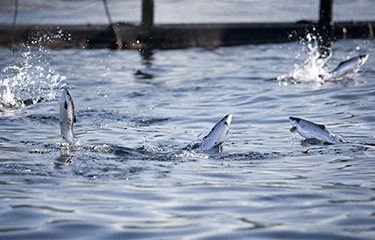Cermaq Canada has been denied permits to transfer 1.5 million salmon smolt to farms in the Discovery Islands in British Columbia, Canada after a court dismissed the company’s injunction against a Department of Fisheries and Oceans (DFO) decision.
The denial will effectively force the company to cull all 1.5 million salmon, the company said in a release, if a further judicial review proves unsuccessful.
The denial is the latest move in the Canadian government's effort to halt all salmon farming operations in the Discovery Islands. The Department of Fisheries and Oceans announced in December gave all salmon farms in the region just 18 months of operational continuance in the area, an announcement that B.C. communities say they were “blindsided” by.
Salmon farmers in the region, including Cermaq Canada, had requested more time to wrap up its operations in the area in order to avoid culling millions of salmon smolt. A report prepared for the B.C. Salmon Farmers Association by RIAS Inc. found the cullings may cost companies in the area as much as CAD 105.8 million (USD 84.8 million, EUR 71.5 million) in lost profits.
Cermaq Canada is questioning the denial, especially as documents revealed in court indicate that DFO Minister Bernadette Jordan’s decision to deny the transfer of smolt was against the advice of her own department staff. A memorandum sent to the minister indicates that DFO staff supported the approval of transferring the smolt to Venture Point and Brent Island facilities, both located in the Discovery Islands.
“As an organization, we are perplexed by the decision from Department of Fisheries and Oceans Canada Minister Bernadette Jordan as salmon farming itself is in support of so many of both her and Prime Minister Trudeau’s goals for the country,” Cermaq Canada Managing Director David Kiemele said. “We are also surprised to see that the minister has ignored her department's advice in favor of what we can only assume is a politically driven agenda.”
The original decision made by Jordan to discontinue salmon farming indicates she reached the decision partially as a result of interactions with local indigenous communities – namely the Homalco, Klahoose, K’ómoks, Kwaikah, Tla’amin, We Wai Kai, and Wei Wai Kum First Nations. The salmon farms are located on various traditional territories of the communities, and DFO said their consultations “heavily informed the decision” to discontinue salmon farming.
Cermaq Canada, however, said it has been working with the Wei Wai Kum Nation – the first nation community in which the two proposed transfer farms are located. In April, the Wei Wai Kum Council voted unanimously to support an agreement to allow the transfer, an agreement which also “would have allowed for shared wild salmon conservation initiatives, an economic transition, capacity building, the creation of a Guardian program (Nation oversight of Cermaq’s operations in its territory), and knowledge sharing,” according to Cermaq.
“We are perplexed as to why we find ourselves in this position. Both the Nation and Cermaq have been working hard to find middle ground and offer solutions to Minister Jordan which would not only support her plan to develop a blue economy and support wild salmon, but also support the overall Liberal governments commitment to truth and reconciliation in Canada,” Cermaq Canada Sustainable Development Director Linda Sams said. “In the coming days, we will be looking to further understand the decision as well as reaching out to the Wei Wai Kum Nation to determine how we can support them.”
Jordan’s decision, according to Cermaq, will be a blow to the local communities including First Nation residents, and that the decision appears to be motivated by securing votes in unaffected areas of the country.
“Initially, we had believed that the Liberal government of Canada was one which built on the principals of inclusivity and was led by a belief and trust in Canadian-led research and science, as well as fundamental support for further truth and reconciliation in Canada,” Kiemele said. “From where we stand today, it appears that the decisions coming from both Ottawa and Nova Scotia are not in fact supportive of these positions but are instead aimed at securing urban Liberal votes.”
Salmon farmers in the region have pushed for a judicial review of the decision, which is scheduled for 18 October in Vancouver. If a judicial review again denies transfer of any permits, then Cermaq Canada will be forced to cull the smolts.
Cermaq Canada added it still has not received adequate reasoning on why the denial was necessary.
“The inability of Minister Jordan to provide an adequate statement as to why she has denied our requests, to us, points to motives outside of science and social license and likely towards securing urban votes as we head into an anticipated late-summer election,” Kiemele said.
A 9 July report from Politico revealed Trudeau may be considering a move to dissolve Parliament, forcing an early election in advance of the next fixed national election date of 16 October, 2023. Polling has shown his Liberal Party with statistically significant leads over its rival Conservative Party. The Liberal Party lost its majority in 2019 but Trudeau returned to power by forming a minority government.
Photo courtesy of Cermaq Canada







